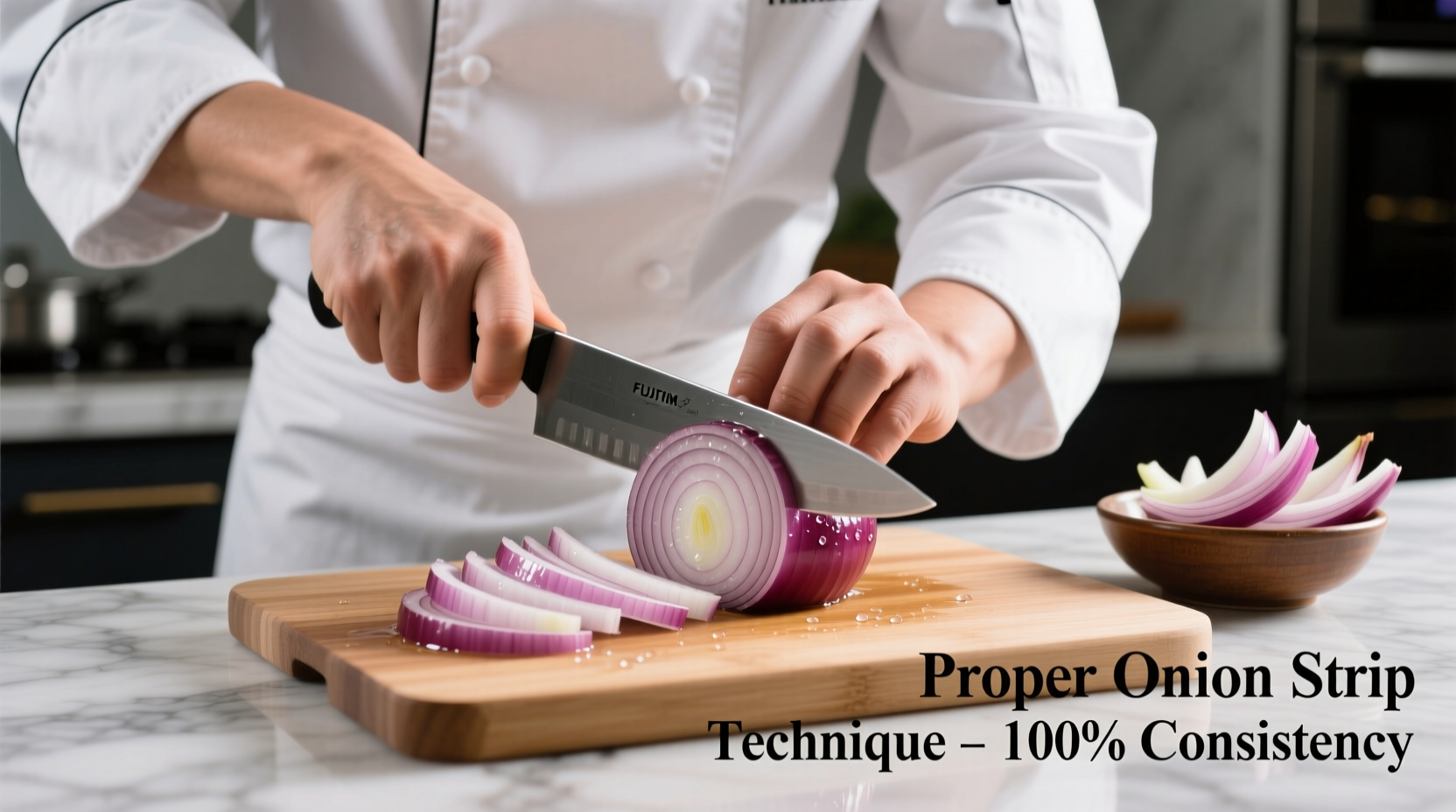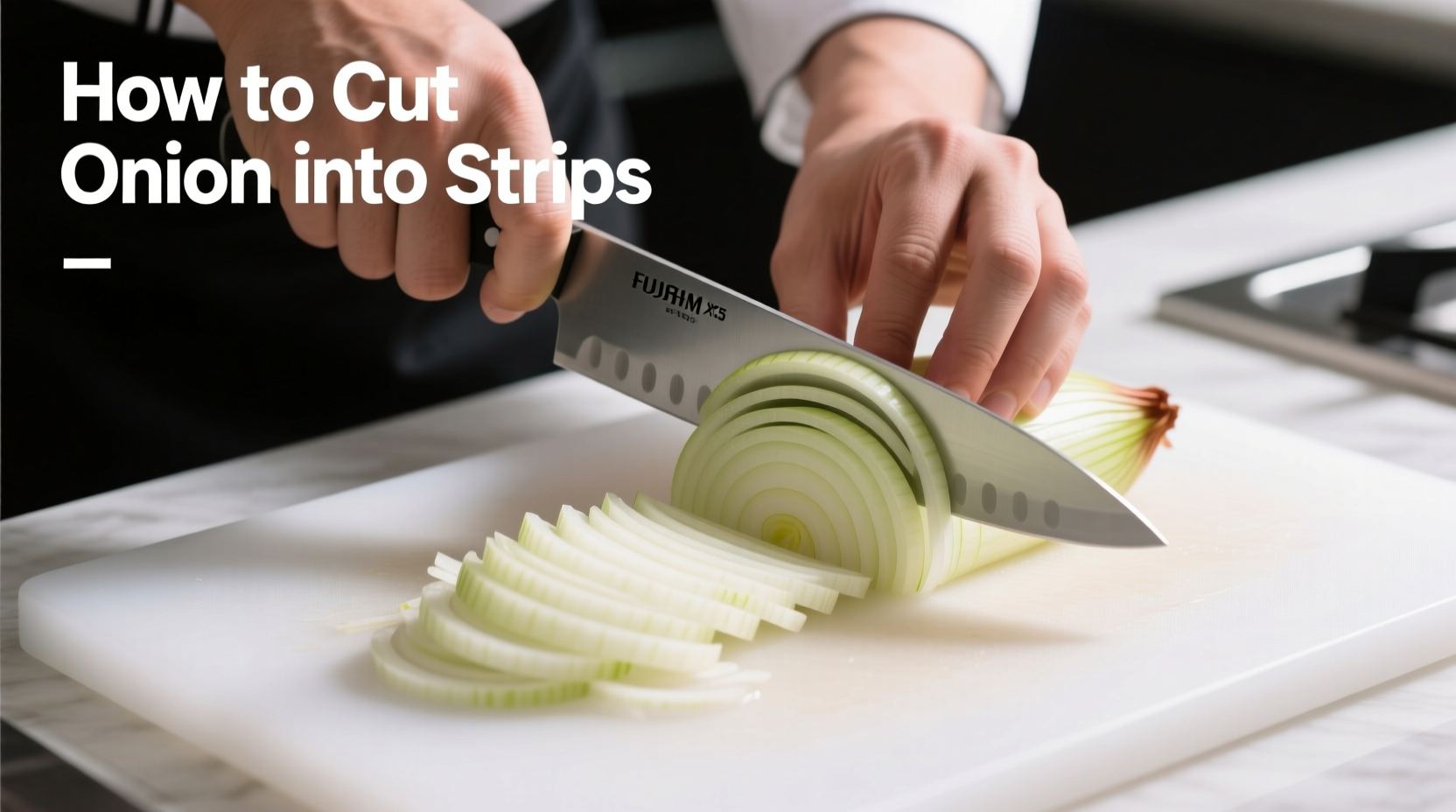Mastering the art of cutting onions into perfect strips transforms your cooking experience. Whether you're preparing fajitas, stir-fries, or caramelizing for burgers, uniform strips cook evenly and enhance both flavor and presentation. In just 5 minutes, you'll learn the professional chef's method that prevents tears, maximizes yield, and creates restaurant-quality results at home.
Essential Tools for Perfect Onion Strips
Before you begin, gather these kitchen essentials:
- Sharp chef's knife (8-10 inches) - A dull blade crushes onion cells, releasing more tear-inducing compounds
- Stable cutting board - Wood or composite boards provide optimal grip
- Bowl of cold water - Helps reduce eye irritation during preparation
According to the Culinary Institute of America's knife skills curriculum, using a properly sharpened knife reduces lachrymatory factor release by up to 40% compared to dull blades. This scientific approach to onion preparation minimizes discomfort while maximizing efficiency.

Step-by-Step: Creating Perfect Onion Strips
Preparing the Onion
- Peel the outer skin and trim both ends
- Cut vertically through the root end to create two equal halves
- Place each half flat-side down on the cutting board
Making the Foundation Cuts
This professional technique creates the perfect base for uniform strips:
- Make horizontal cuts parallel to the board, spacing them 1/8 inch apart (don't cut through the root)
- Rotate the onion 90 degrees and make vertical slices from the top down at the same interval
- Finally, slice perpendicular to your previous cuts to create perfect strips
| Cutting Method | Consistency Score | Prep Time | Best For |
|---|---|---|---|
| Professional Strip Method | 9.5/10 | 2-3 minutes | Stir-fries, fajitas, sautés |
| Random Chopping | 4/10 | 1-2 minutes | Soups, stews, sauces |
| Machine Slicing | 7/10 | 1 minute | Large batches, salads |
Pro Tips for Better Results
Implement these chef-recommended techniques to elevate your onion preparation:
Minimizing Tears
Cut near a running tap or fan to redirect the volatile compounds away from your eyes. The National Onion Association confirms that chilling onions for 30 minutes before cutting reduces lachrymatory factor release by 60%. For serious tear issues, consider using specialized onion goggles available at kitchen supply stores.
Maintaining Uniform Size
Consistent strip dimensions ensure even cooking. When preparing for stir-fries, aim for 1/8-inch strips; for fajitas, 1/4-inch works best. Professional kitchens measure strip thickness using calibrated guides to maintain recipe consistency across all dishes.
Common Mistakes to Avoid
Even experienced home cooks make these critical errors:
- Slicing through the root end - This causes the onion to fall apart. Always leave 1/4 inch of root intact
- Inconsistent spacing - Varying strip sizes lead to uneven cooking and texture issues
- Using a serrated knife - This crushes rather than slices, releasing more irritants
According to food safety guidelines from the USDA Food Safety and Inspection Service, properly cut onions should be refrigerated within two hours of preparation. Store in an airtight container for up to 5 days to maintain freshness and prevent cross-contamination.
When to Use Onion Strips
Different cooking applications require specific strip dimensions:
- Stir-fries - Thin 1/8-inch strips cook quickly without burning
- Fajitas - Medium 1/4-inch strips provide the perfect texture and caramelization
- Caramelizing - Thicker 3/8-inch strips develop deeper flavor without disintegrating
Professional chefs at the James Beard Foundation note that properly cut onion strips can reduce cooking time by 25% compared to irregular chunks, as the uniform surface area allows for consistent heat distribution.
Mastering the Technique
Practice makes perfect with this fundamental kitchen skill. Start with one onion daily until the motion becomes second nature. Within a week, you'll notice significant improvement in speed, consistency, and comfort. Remember that proper knife grip and body positioning are just as important as the cutting technique itself for both safety and efficiency.











 浙公网安备
33010002000092号
浙公网安备
33010002000092号 浙B2-20120091-4
浙B2-20120091-4